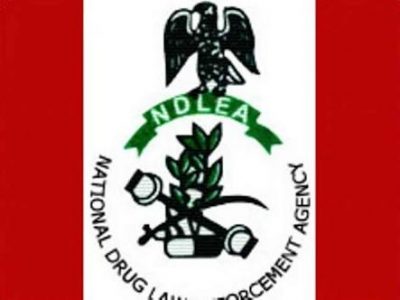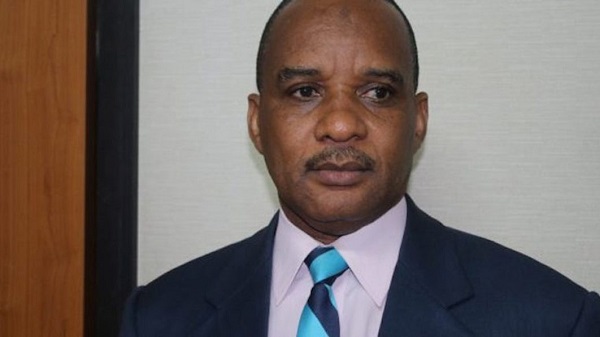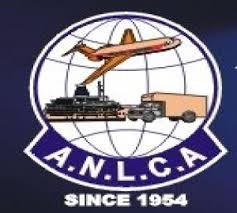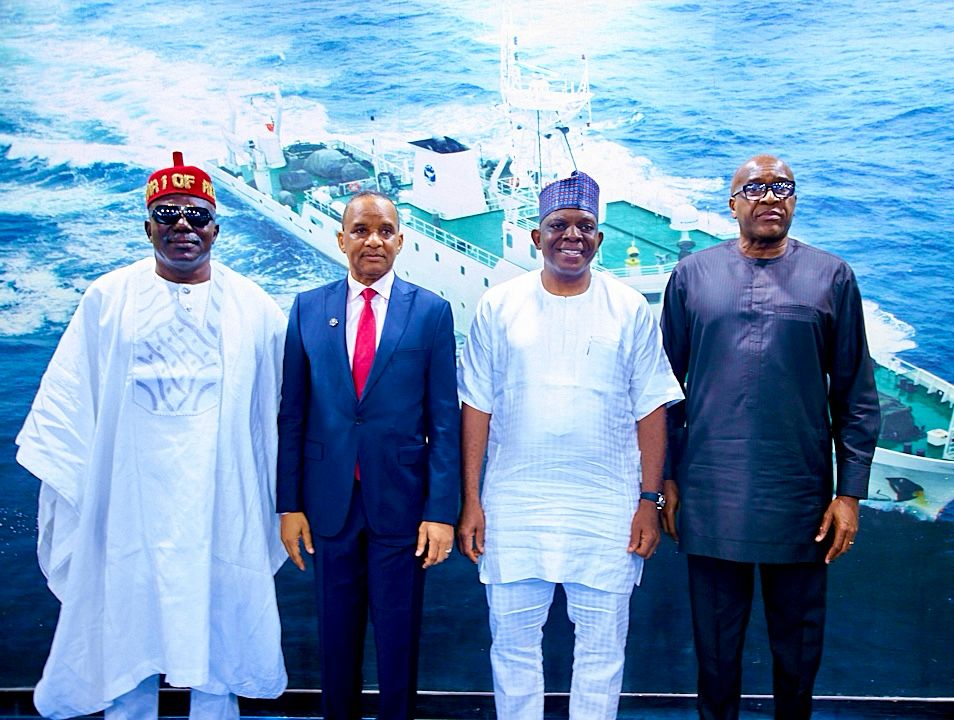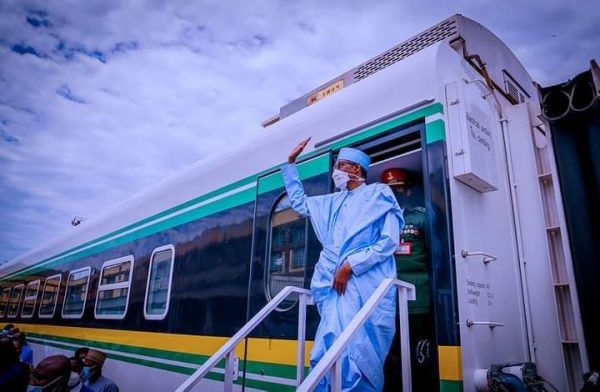NEWS LENS
How NDLEA Was ‘Smuggled’ Into The Ports – Presidential Port Reforms committee members explain
- Presidency, NPA, NDLEA give conflicting lists
- How FG frustrates 24 hours cargo delivery order
By Kenneth Jukpor
Following the controversy over the accurate list of government agencies allowed to operate in the nation’s ports, MMS Plus findings have revealed how the National Drug Law Enforcement Agency (NDLEA) was smuggled into the list in 2012.
This controversy started when the Managing Director of the Nigerian Ports Authority (NPA), Ms. Hadiza Bala-Usman recently called for stakeholders’ meeting to discuss the headway to implementing the Executive Orders on port operations within the context of the Ease of Doing Business agenda recently issued by Acting President, Prof. Yemi Osinbajo.
At the meeting, the NPA boss named the seven agencies to operate in the ports to include: Nigerian Ports Authority (NPA), Nigerian Customs Service (NCS); Nigerian Maritime Administration and Safety Agency (NIMASA); Nigeria Police; Department of State Security (DSS); Nigerian Immigration Service (NIS) and Port Health Service. This led to an objection by the NDLEA boss, Col. Mustapha Abdallah (Rtd) and the NPA boss remarked that NDLEA was part of the list.
However, the controversy continued to brew as the Principal Manager, Public Affairs of NPA, Ibrahim Nasiru issued a press release highlighting the seven agencies above (excluding NDLEA) as the authorized agencies to operate in the ports. This position has been debunked by NDLEA who have insisted that they are statutorily obligated to operate in the ports.
To make clarifications, MMS Plus spoke to one of the 2012 presidential port reforms committee members who pleaded anonymity as he explained how NDLEA was allowed to remain in ports to enable the nation curtail the increased importation of hard drugs at the time of the committee’s work.
“The reason NDLEA was allowed to stay in the ports was as a result of the high rate of importation of drugs at that time (2012). The committee included NDLEA in order to monitor the issue of drug trafficking which was a major menace at that time”, the source stated
However, he lamented that the major problem NDLEA’s presence in the port poses isn’t the inspection of containers but the agency’s inclination to extort the importing public in order to generate revenue for the government.
“The bottleneck is that NDLEA would interfere in examination of goods that have nothing to do with their operations. They would also insist that if they aren’t paid the container would be seized and the Nigeria Customs Service isn’t helping the situation because they (Customs) insist that one has certification from all the agencies at the ports before a cargo leaves. This is wrong! These agencies fight to remain in the ports with the excuse that they are protecting the interest of the nation but the main reason they want to be in the port is to ensure monies go into their pockets” the source said.
The list of agencies to reside in the ports issued by the Presidential committee on port reforms in 2012 are Nigeria Customs Service (NCS); Nigerian Maritime Administration and Safety Agency (NIMASA); Nigeria Police; Department of State Security (DSS); Nigerian Immigration Service (NIS), Port Health and the National Drug Law Enforcement Agency (NDLEA).
The Nigerian Ports Authority wasn’t included in that list probably as they were seen as the landlord of the ports.
However, when contacted to explain NPA’s omission on the list, the chairman of the presidential committee on port reforms at the time, Prof. Sylvester Monye told MMS Plus that he wouldn’t comment on the issue because he left the government two years ago.
Prof. Monye, who was the Special Adviser to President Goodluck Jonathan on Monitoring and Project Implementation had chaired the committee which included; the Director General of Bureau of Public Enterprises; Ms Bolanle Onagoruwa, Special Adviser to the President on maritime affairs, Mr. Leke Oyewole; Executive Secretary, Nigerian Shippers’ Council, Capt. Adamu Biu, Managing Director of construction giants; Julius Berger, the CEOs of: Emzor Pharmaceuticals; Mrs. Stella Okoli, Coscharis Group; Chief Vincent Maduka, Zinox Computers; Mr Leo Stan Ekeh, Omak Computers, Mrs. Florence Seriki, Flour Mills; Chief Ukpabi, National President, Association of Nigerian Licensed Customs Agents, Prince Olayiwola Shittu, among others.
On his part, the Head of Public Affairs at NDLEA, Mr. Mitchell Ofoyeju told our correspondent that NDLEA was part of the agencies certified by the Presidency to reside in the ports.
Ofoyeju had also issued a press release where NDLEA threatened to take legal actions against any act of misinformation calculated to obstruct the activities of the agency at the seaports.
“The operations of the NDLEA at the seaports is statutory and it is pertinent to set the records straight. This clarification is imperative in the light of conflicting reports intended to mislead members of the public on the official position”, the release read.
According to NDLEA, the agencies recognized and approved by the Federal Government at the seaports include Nigerian Ports Authority (NPA), the Nigerian Customs Service (NCS), Nigerian Maritime Administration and Safety Agency (NIMASA), Department of State Services (DSS), Nigerian Police, Nigerian Immigration Service (NIS), National Drug Law Enforcement Agency (NDLEA) and the Port Health Authority (PHA).
Meanwhile, in another recent press release, NPA reiterated the subsistence of a 2011 presidential directive for the reduction of the number of agencies that are to operate and have physical representation at the ports to eight.
NPA recalled that, “The directive communicated to the Managing Director of NPA in a 26th October, 2011 memo from the Federal Ministry of Transportation, listed the eight approved agencies as: Nigerian Ports Authority (NPA); Nigerian Customs Service (NCS); Nigerian Maritime Administration and Safety Agency (NIMASA); Nigeria Police; Department of State Security (DSS); Nigerian Immigration Service (NIS) and Port Health.”
“It also stated that while the Nigerian Drug Law Enforcement Agency (NDLEA) should remain at the ports, a methodology which would ensure that only relevant cargoes are inspected by the agency, should be worked out.” NPA press release stated.
Five years have passed since this directive was issued by the then Minister of Finance and Co-ordinating Minister for the Economy, Dr. Ngozi Okonjo-Iweala, but maritime stakeholders are yet to see the ‘methodology’ that should regulate the operations of NDLEA at the nation’s ports.
Whilst NPA has admonished those agencies not mentioned in the list above such as Nigerian Quarantine Service (NQS), Standards Organization of Nigeria (SON), National Agency for Food Drug Administration and Control (NAFDAC), among others., to remain outside the port premises while the Authority develops standard procedures to facilitate their seamless operation, the major impediment to the realization of the 24 hours cargo delivery has been highlighted as the port access roads.
The Presidential committee member on port reforms stated this, even as he recalled that in 2012 the Presidential committee also came up with pragmatic steps to expedite cargo clearance.
“The Federal Government got it wrong when it neglected our report on five smart steps to cargo clearance. If our plans had been implemented the nation should have been able to achieve 48 hours cargo delivery time if 24 hours isn’t attainable. That report was endorsed by President Goodluck Jonathan, yet no action was taken.”
“The problems at the ports seem to be complicated and syndicated as everyone slows down the job in order to benefit. When shipping companies and terminal operators see a vessel arrive, they begin to count their gains and develop strategies to cause delay. The longer it takes to discharge the cargo, the more profit these people make. It doesn’t matter if the delay is caused by the road or any of the government agencies” the source added.
Although the Executive Order posits 24 hours cargo delivery, the port stakeholders are yet to understand when the 24 hours cargo clearance would be said to have been achieved. At what point does one begin to count the 24 hours?
However, the dilapidated state of the port access roads leaves to be desired about the realization of the 24 hours cargo delivery time. It is also worrisome that the Minister of Transportation, Hon. Rotimi Amaechi has seldom showed concern about the state of the road. Recall that on Amaechi’s maiden visit to the Lagos ports as the Minister of Transport, he was given a publication of MMS Plus newspaper on the shambolic state of port roads titled, “Apapa Gridlock: Arrest Amaechi!” but he was quick to state that the responsibility of fixing the roads wasn’t his responsibility.

